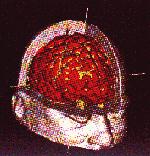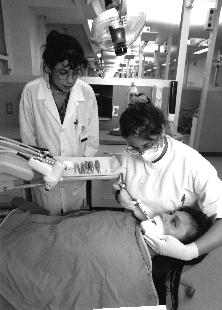 Medical informatics. The name doesn't sound very
inspiring. What it is, though, is something quite
revolutionary: a dramatic innovation that will
eventually change the way medicine is taught at McGill.
Aided by a $3.75 million grant from the Molson
Foundation, the Faculty of Medicine is placing its first-
and second-year curriculum, including lecture material
and full-colour, 3-D clinical simulations, onto CD-ROM
and the Internet. This will not only replace reams of
notebooks and flat images but, in the long run, alter
the function of teachers, who will be able to spend more
time in discussion and less on lecturing. "The idea is
to take the medical knowledge sitting in the heads of
our world-renowned experts," says David Fleiszer,
BSc'69, MD'73, MSc'79, Assistant Dean of Medical
Informatics, "and put it into the computer in an
interactive form."
Medical informatics. The name doesn't sound very
inspiring. What it is, though, is something quite
revolutionary: a dramatic innovation that will
eventually change the way medicine is taught at McGill.
Aided by a $3.75 million grant from the Molson
Foundation, the Faculty of Medicine is placing its first-
and second-year curriculum, including lecture material
and full-colour, 3-D clinical simulations, onto CD-ROM
and the Internet. This will not only replace reams of
notebooks and flat images but, in the long run, alter
the function of teachers, who will be able to spend more
time in discussion and less on lecturing. "The idea is
to take the medical knowledge sitting in the heads of
our world-renowned experts," says David Fleiszer,
BSc'69, MD'73, MSc'79, Assistant Dean of Medical
Informatics, "and put it into the computer in an
interactive form."
Although the program is unique in Canada -- several
American schools have the technology -- McGill and other
universities, including Sherbrooke, Laval and Montreal,
will develop a consortium to share the information.
Students will eventually have access to files from other
med schools, enabling each university to specialize and
become more efficient. The material will also be
accessible to doctors and patients.
A teaching module from the first four weeks of the
curriculum,"Molecules, Cells and Tissues," has been
developed as a demonstration; by September, several
teaching units will be available to students. 
Most National, Most International
McGill students this academic year will experience the
most diverse student body of any Canadian university.
According to Registrar's Office statistics, McGill has
the most out-of-province students, some 36.2 percent at
the undergraduate level, and the most foreign students,
11 percentof the total student body. "We recruit
locally, nationally and internationally to encourage a
great number of high-quality applications," says
Director of Admissions Mariela Johansen. She says the
culturally varied city of Montreal is an attraction for
out-of-province students, many of whom have come through
French immersion and want to use the language. 
Right on, Rhodes
Like proud parents announcing births, McGill is
delighted to present the two Rhodes Scholars for 1996:
Shariq Lodhi, 21, of Saint John, New Brunswick, and Lisa
Grushcow, 21, of Montreal. Lodhi is a dean's list
chemistry student who has competed in varsity rowing and
cross-country skiing. He plays the cello and organizes
concerts for the Royal Victoria Hospital Palliative Care
Unit which uses music therapy to comfort patients. He
hopes to become a doctor after studying at Oxford.
Grushcow is studying political science, with a minor in
Jewish Studies, and hopes to become a rabbi. She is
currently the Students' Society vice-president of
student affairs and has a wide range of extracurricular
activities, from journalism and acting to women's
groups. She will study within Oxford's Faculty of
Oriental Studies and Theology. 
By the Skin of their Teeth
The closing of the Faculty of Dentistry was a done deal.
Or so most people thought
by Allen Konigsberg
 July 17, 1991, could have gone down as Black Wednesday
in the 95-year Faculty of Dentistry history. Instead, it
became a footnote and major turning point that rallied
dental faculty, students, alumni and Montreal-area
supporters.
July 17, 1991, could have gone down as Black Wednesday
in the 95-year Faculty of Dentistry history. Instead, it
became a footnote and major turning point that rallied
dental faculty, students, alumni and Montreal-area
supporters.
On that 1991 day, Principal
David Johnston announced to the Dentistry professors
that the University governance had decided that the
Faculty would stop admitting students and close by 1996.
He said the high cost of educating dental students and
the Faculty's lack of research and post-graduate
programs left the administration no choice. In short,
Dentistry did not fulfill McGill's latest stated
priorities: to become a major research institution with
a high proportion of graduate students.
Present at the fateful announcement was Montreal dentist
Norman Miller, DDS'74, a McGill part-time lecturer. In
an interview from his Westmount office, Miller recalls,
"I asked what could be done to change the decision. They
said, 'Nothing. The money you could raise couldn't
possibly be enough.' But they couldn't answer me when I
asked how much money would be needed to save the school,
because they never thought of the possibility."
Miller organized a committee of fellow lecturers and
began a campaign to fight the decision." The benefits of
the school go to the public," says Miller. "We thought
the public should be informed." Graduates, too, would be
affected: Dentistry's closing could decrease the value
of the degrees of its 1,900 alumni. The support was
immediate. Miller's group raised nearly $20,000 to hire
a public relations person to communicate Dentistry's
merit. The implications of the loss of Quebec's only
anglophone dental school were well covered in the daily
media.
After vocal student demonstrations and alumni
protestations, the McGill administration came up with a
renewal plan for the Faculty in September 1991. It had
one year to fulfill eight conditions: decrease the
number of students from 26 to 24; develop a master's
degree program that would attract research funds;
increase faculty research; decrease the salaries of
casual lectures; establish criteria for evaluating
academic performance; ensure that the dental clinic
would become self-financing; arrange to rent clinic and
research space at the Montreal General Hospital; and,
finally, raise $1.6 million to upgrade equipment.
The apparent stumbling block was the last requirement.
But Nicholas Offord, Director of McGill's Development
Office at the time, drew up the fundraising game plan.
Offord recently told the McGill News, "What we tried to
impress on alumni was, 'Are you ready to let the Faculty
fall because of $1.6 million?' " "The community put its
money where its mouth was," Miller says. "We raised the
money in less than six months." In October 1992,
Principal Johnston announced that Dentistry had met its
conditions and would remain open.
Last September, the Faculty introduced its new McCall
Dental Clinic at the Montreal General Hospital.
Generosity, and luck, played a large part in the
clinic's opening, which offers the latest dental
technology at a reduced cost to the public. A
significant portion of the facility's funds was donated
by McGill philosophy professor Storrs McCall, BA'52,
through The McGill Twenty-First Century Fund. Professor
McCall says, "I was looking to make a donation in the
field of medicine in the name of my parents [G. Ronald
McCall, BSc(Arts)'21, MD'39, DipPH'41, and M. Frances
McCall, BA'26, MD'42]. And the most pressing need was
the dental clinic, which serves the community and had
outdated equipment."
As per the other conditions, the Faculty now joins
several Canadian universities in offering a master's
program, and has more researchers on staff, including
new dean, James Lund. Part-time lecturers earn about
half of what they once made. "That wasn't a big deal,"
says Miller. "Even before, our staff was able to earn
much more doing clinical work than teaching. They do it
for the benefits of teaching at a university." Miller,
who is now the Faculty's first Associate Dean, Community
Relations, says, "What we face now is what the
University faces: budget cuts."
Dentistry is currently changing its curriculum, and
dental students now attend some medical school classes.
Their experience can be translated to other struggling
areas of McGill, says Miller. "Dentistry needed to
change the way it managed itself. I think that if the
issue is resources, it's fixable. It boils down to
finding alternative solutions." 

 Medical informatics. The name doesn't sound very
inspiring. What it is, though, is something quite
revolutionary: a dramatic innovation that will
eventually change the way medicine is taught at McGill.
Aided by a $3.75 million grant from the Molson
Foundation, the Faculty of Medicine is placing its first-
and second-year curriculum, including lecture material
and full-colour, 3-D clinical simulations, onto CD-ROM
and the Internet. This will not only replace reams of
notebooks and flat images but, in the long run, alter
the function of teachers, who will be able to spend more
time in discussion and less on lecturing. "The idea is
to take the medical knowledge sitting in the heads of
our world-renowned experts," says David Fleiszer,
BSc'69, MD'73, MSc'79, Assistant Dean of Medical
Informatics, "and put it into the computer in an
interactive form."
Medical informatics. The name doesn't sound very
inspiring. What it is, though, is something quite
revolutionary: a dramatic innovation that will
eventually change the way medicine is taught at McGill.
Aided by a $3.75 million grant from the Molson
Foundation, the Faculty of Medicine is placing its first-
and second-year curriculum, including lecture material
and full-colour, 3-D clinical simulations, onto CD-ROM
and the Internet. This will not only replace reams of
notebooks and flat images but, in the long run, alter
the function of teachers, who will be able to spend more
time in discussion and less on lecturing. "The idea is
to take the medical knowledge sitting in the heads of
our world-renowned experts," says David Fleiszer,
BSc'69, MD'73, MSc'79, Assistant Dean of Medical
Informatics, "and put it into the computer in an
interactive form." 
 July 17, 1991, could have gone down as Black Wednesday
in the 95-year Faculty of Dentistry history. Instead, it
became a footnote and major turning point that rallied
dental faculty, students, alumni and Montreal-area
supporters.
July 17, 1991, could have gone down as Black Wednesday
in the 95-year Faculty of Dentistry history. Instead, it
became a footnote and major turning point that rallied
dental faculty, students, alumni and Montreal-area
supporters. 